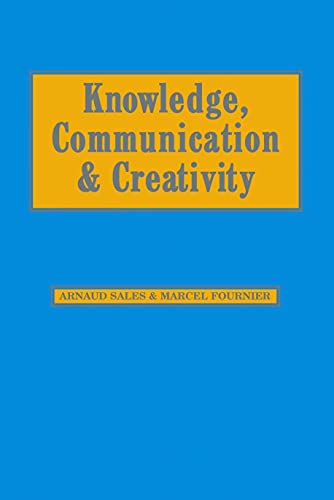Knowledge, Communication and Creativity
Arnaud Sales holds a Doctorat d'État ès Lettres et Sciences Humaines, from Université de Paris 7-Denis Diderot. He is Emeritus Professor of Sociology at the University of Montreal, Canada. He is a specialist in economic sociology focusing on the interface of the economic and political fields. His research interests center on the relations between the public and private spheres, and the emergence of international private authorities; economic and administrative elites, and knowledge workers; the role of knowledge in social transformations. His publications include: La Bourgeoisie industrielle au Québec (PUM, 1979); Décideurs et gestionnaires (Éditeur officiel du Québec, 1985); He has edited or co-edited the following volumes: Développement national et économie mondialisée (Sociologie et Sociétés, 1979); La recomposition du politique (PUM/L’Harmattan, 1991); Québec, fin de siècle (Sociologie et Sociétés,1994); The International Handbook of Sociology (Sage, 2000); New Directions in the Study of Knowledge, Economy and Society (SSIS, Current Sociology, Sage, 2001) ; Knowledge, Communication and Creativity, (Sage, 2007). He was Vice-Dean of the Université de Montréal’s Faculty of Graduate Studies (1987-1992) and has chaired the Department of Sociology (2000-2007). He is a former Vice-President, International, of the Society for the Advancement of Socio-Economics (1995-1998) where he founded the Knowledge, Economy and Society Network with R. Hollingsworth. After chairing the ISA Research Committee 02 on Economy and Society, he was elected Vice-President for Research (1998-2002) of the International Sociological Association and chaired ISA Research Council. In 2006, he was named Chevalier de l’Ordre des Palmes Académiques of France.
Knowledge, communication, and creativity are obsessions of contemporary modern societies. The rhetoric of information, imagination, improvisation and play have invaded our daily lives and work spaces. However, little attention has been paid to the sociological relationships among these elements, let alone their impacts as processes driving social change. This book offers penetrating explorations into the creative processes that are tied to knowledge production, shedding new light on: The impact of a general increase in knowledge on individuals, lifestyles, institutions and technologies How new communication and information technologies are transforming social relationships, communities and the international public sphere Understanding the ties between creativity, communication and the production of knowledgeThis book is critical reading for anyone interested in understanding the Knowledge Society and how its new technologies of communication are transforming contemporary society.











